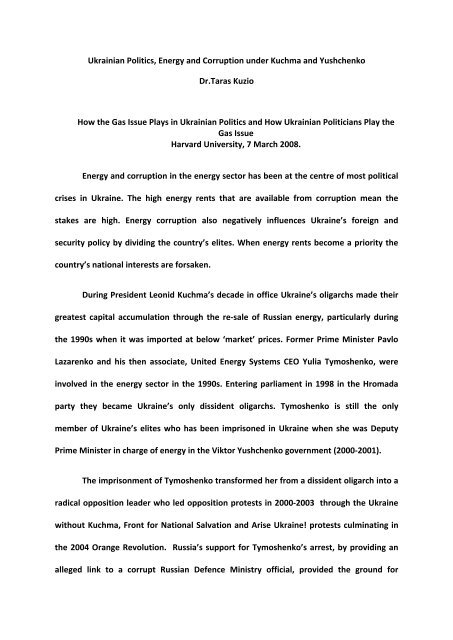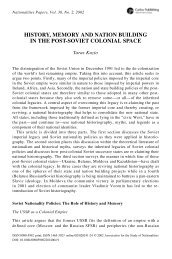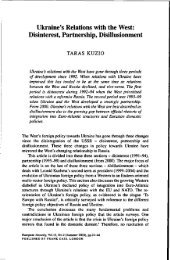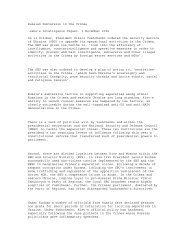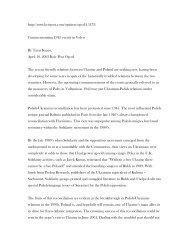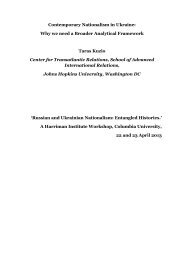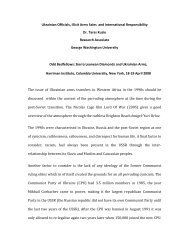Ukrainian Politics, Energy and Corruption under ... - Taras Kuzio
Ukrainian Politics, Energy and Corruption under ... - Taras Kuzio
Ukrainian Politics, Energy and Corruption under ... - Taras Kuzio
You also want an ePaper? Increase the reach of your titles
YUMPU automatically turns print PDFs into web optimized ePapers that Google loves.
<strong>Ukrainian</strong> <strong>Politics</strong>, <strong>Energy</strong> <strong>and</strong> <strong>Corruption</strong> <strong>under</strong> Kuchma <strong>and</strong> Yushchenko <br />
Dr.<strong>Taras</strong> <strong>Kuzio</strong> <br />
<br />
How the Gas Issue Plays in <strong>Ukrainian</strong> <strong>Politics</strong> <strong>and</strong> How <strong>Ukrainian</strong> Politicians Play the <br />
Gas Issue <br />
Harvard University, 7 March 2008. <br />
<br />
<strong>Energy</strong> <strong>and</strong> corruption in the energy sector has been at the centre of most political <br />
crises in Ukraine. The high energy rents that are available from corruption mean the <br />
stakes are high. <strong>Energy</strong> corruption also negatively influences Ukraine’s foreign <strong>and</strong> <br />
security policy by dividing the country’s elites. When energy rents become a priority the <br />
country’s national interests are forsaken. <br />
During President Leonid Kuchma’s decade in office Ukraine’s oligarchs made their <br />
greatest capital accumulation through the re‐sale of Russian energy, particularly during <br />
the 1990s when it was imported at below ‘market’ prices. Former Prime Minister Pavlo <br />
Lazarenko <strong>and</strong> his then associate, United <strong>Energy</strong> Systems CEO Yulia Tymoshenko, were <br />
involved in the energy sector in the 1990s. Entering parliament in 1998 in the Hromada <br />
party they became Ukraine’s only dissident oligarchs. Tymoshenko is still the only <br />
member of Ukraine’s elites who has been imprisoned in Ukraine when she was Deputy <br />
Prime Minister in charge of energy in the Viktor Yushchenko government (2000‐2001). <br />
The imprisonment of Tymoshenko transformed her from a dissident oligarch into a <br />
radical opposition leader who led opposition protests in 2000‐2003 through the Ukraine <br />
without Kuchma, Front for National Salvation <strong>and</strong> Arise Ukraine! protests culminating in <br />
the 2004 Orange Revolution. Russia’s support for Tymoshenko’s arrest, by providing an <br />
alleged link to a corrupt Russian Defence Ministry official, provided the ground for
Russia’s massive intervention in Ukraine’s 2004 presidential elections. One aspect of <br />
Russia’s intervention was the five year contract to supply gas at $50 per 1,000 cubic <br />
metres of gas for the Viktor Yanukovych government. As Yanukovych lost the 2004 <br />
elections the contract was torn up by Russia in 2006. <br />
In the 1990s Ukraine’s Soviet era senior nomenklatura transformed their political <br />
influence into economic power. This became apparent during the 1998 elections when the <br />
former ‘sovereign communist’ nomenklatura re‐entered <strong>Ukrainian</strong> politics in centrist <br />
parties. <strong>Ukrainian</strong> oligarchs, <strong>and</strong> corruption from the energy sector through the then <br />
newly established Naftohaz Ukrainy, provided crucial resources for Kuchma to win the <br />
1999 elections. The oligarchs played the same role as their Russian counterparts had in <br />
ensuring Borys Yeltsin’s re‐election in 1996. Naftohaz Ukrainy CEO Ihor Bakay <strong>and</strong> <br />
business ally Oleks<strong>and</strong>r Volkov (head of the Democratic Union) were political satellites of <br />
the Social Democratic united Party (SDPUo) led by Viktor Medvedchuk. The SDPUo was at <br />
the centre of the most important crises in Kuchma’s second term, the Kuchmagate crisis of <br />
2000‐2001 <strong>and</strong> the political crises between the 2002 parliamentary <strong>and</strong> 2004 presidential <br />
elections when the SDPUo led <strong>and</strong> dominated the presidential administration. <br />
The use of energy rents continued through the development of gas middlemen. <br />
First, Eural Trans Gas in 2002‐2003 <strong>and</strong> then Rosukrenergo from 2004. Rosukrenergo <br />
became a source of conflict within the orange camp in January 2006, when the <br />
Tymoshenko bloc (BYuT) voted for a parliamentary no confidence motion in the Yuriy <br />
Yekhanurov government (Yekhanurov then headed the pro‐presidential Our Ukraine <br />
bloc), <strong>and</strong> in January‐February 2008 when Yushchenko supported <strong>and</strong> Tymoshenko <br />
opposed the continued use of Rosukrenergo.
These developments paved the way for the attempted monopolisation of power <br />
by centrist oligarchs during Kuchma’s second term (1999‐20004). This drive towards <br />
monopolisation of power culminated in the attempt at imposing Prime Minister <strong>and</strong> Party <br />
of Regions leader Viktor Yanukovych as Kuchma’s successor in 2004. The Party of Regions <br />
are the only pro‐Kuchma party to have remained influential in <strong>Ukrainian</strong> politics in the <br />
post‐Orange Revolution era, going on to win first place in the 2006 <strong>and</strong> 2007 elections. <br />
The political culture of the Party of Regions could be seen in its second attempt at <br />
monopolising power in the 2006‐2007 Anti‐Crisis government which was stopped in its <br />
tracks by the 2 April 2007 decree dissolving parliament. <br />
The issue of what to do with oligarchs <strong>and</strong> their place in <strong>Ukrainian</strong> society <strong>and</strong> <br />
politics has continued to bedevil Ukraine since the Orange Revolution. Democratic <br />
revolutions, such as Ukraine, were fuelled by anti‐oligarch <strong>and</strong> anti‐corruption sentiment <br />
that had built up over the previous years <strong>under</strong> corrupt leaders, whether Slobodan <br />
Milosevic, Eduard Shevardnadze or Kuchma. How to deal with the oligarchs have been at <br />
the centre of the divisions between Yushchenko <strong>and</strong> Tymoshenko. Imprisoning or exiling <br />
oligarchs, which was autocratic Russia’s policy <strong>under</strong> President Vladimir Putin, could not <br />
be applied in democratic Ukraine. <br />
<strong>Ukrainian</strong> oligarchs were also not a united group. Three oligarchic groups – Pryvat, <br />
Industrial Union of Donbas <strong>and</strong> the exiled Russian oligarch Boris Berezovskiy – had <br />
provided funds for the Orange Revolution. Others had sat on the fence (parliamentary <br />
speaker Volodymyr Lytvyn). Following the Orange Revolution some oligarchs had opted to <br />
leave politics most notably the Dnipropetrovsk clan’s Serhiy Tyhipko, Viktor Pinchuk), <br />
others (Donetsk clan’s Systems Capital Management Renat Akhmetov) had entered
politics while others (Pryvat group) continued to remain outside politics. The <br />
Dnipropetrovsk clans Trudova Ukrayina (Labour Ukraine) party merged with the Party of <br />
Regions in April 2008, the NDP (Peoples Democratic Party) is to merge with the propresidential Yedyny Tsentr (United Centre) party while the SDPUo has become completely <br />
marginalised as a political force. <br />
The separation of business <strong>and</strong> politics, which was one of the dem<strong>and</strong>s of the <br />
Orange Revolution, has not taken place <strong>under</strong> Yushchenko. There are a greater number of <br />
businessmen in the <strong>Ukrainian</strong> parliament today than there were <strong>under</strong> Kuchma. <br />
Lack of progress in the separation of business <strong>and</strong> politics is coupled with weak <br />
progress in establishing the rule of law <strong>and</strong> battling high level corruption. The <strong>Ukrainian</strong> <br />
elites continue to remain above the law. Presidential control over the Prosecutor‐<br />
General’s office <strong>under</strong> both the 1996 <strong>and</strong> 2006 constitutions has not brought any <br />
improvement in the rule of law, not surprising considering the choice of c<strong>and</strong>idates, <br />
Svyatoslav Piskun <strong>and</strong> Oleks<strong>and</strong>r Medvedko. The award of state medals to former <br />
Prosecutor‐General Mykhailo Potebenko, former Central Election Commission chairman <br />
Sergei Kivalov or Party of Regions campaign manager Boris Kolesnikov sent the wrong <br />
signal on the rule of law that the elites – as in the Kuchma – era continue to remain <br />
beyond prosecution. Former Naftohaz Ukrainy CEO <strong>under</strong> Kuchma, Yuriy Boyko, was to <br />
be arrested for abuse of office in summer 2005 but this was halted by the direct <br />
intervention of the President’s office. <br />
Transparency is central to changing the manner in which business <strong>and</strong> politics is <br />
<strong>under</strong>taken. The Byzantine nature in which power is exercised <strong>and</strong> business is <strong>under</strong>taken <br />
has not fundamentally changed since the Orange Revolution. During three presidential
meetings with oligarchs they have been embraced by Yushchenko <strong>and</strong> Yekhanurov as <br />
Ukraine’s ‘national bourgeoisie’ <strong>and</strong> the elite of the nation upon which Ukraine’s economy <br />
<strong>and</strong> independence is dependent. <br />
The lack of breakthrough in the separation of business <strong>and</strong> politics, rule of law <strong>and</strong> <br />
corruption has led to four important ramifications. <br />
First, public trust in state institutions, particularly the judiciary <strong>and</strong> parliament, <br />
continues to remain very low. Over two thirds of <strong>Ukrainian</strong>s do not believe the authorities <br />
professed anti‐corruption policies are effective; in effect, <strong>Ukrainian</strong>s are saying that the <br />
orange President is continuing Kuchma’s virtual campaign against corruption. <br />
Second, dramatically low support for the President in his first term in office, <br />
making it unlikely he could win a second term, <strong>and</strong> static or declining support for Our <br />
Ukraine. <br />
Third, kompromat continues to play a role in <strong>Ukrainian</strong> politics. The Party of <br />
Regions threatened to unveil energy corruption in the Yushchenko family if he did not <br />
propose Yanukovych as Prime Minister on 4 August 2006. The unexpected return of <br />
Yanukovych to government sparked a political <strong>and</strong> constitutional crisis that led to <br />
parliament’s dissolution <strong>and</strong> pre‐term elections. <br />
Fourth, energy corruption has continued to play central stage in the Yushchenko‐<br />
Tymoshenko conflict. Tymoshenko <strong>and</strong> BYuT have been the only <strong>Ukrainian</strong> political force <br />
that has consistently opposed the use of gas intermediaries. President Yushchenko has <br />
insisted on maintaining Rosukrenergo in place <strong>and</strong> has publicly attacked Tymoshenko on <br />
these issues. The Yushchenko‐Tymoshenko conflict moved from cold to hot war in spring
2008 with BYuT supporting constitutional reforms that would transform Ukraine into a <br />
parliamentary republic <strong>and</strong> the President into a German Chancellor with limited powers. <br />
A 2007 report by the US Atlantic Council on ‘<strong>Corruption</strong>, Democracy <strong>and</strong> <br />
Investment in Ukraine’ concluded that: <br />
<br />
Ukraine has three levers that give it a potentially strong position in energy <br />
negotiations with Russia: WTO membership, gas pipelines that transport 80 percent of <br />
Russian gas to Europe (a figure that will only drop to 60 after the completion of the Baltic‐<br />
German pipeline) <strong>and</strong> gas storage facilities. Ukraine has not used these three levers <br />
because Russia has successfully divided Ukraine’s elites through energy corruption. Elite <br />
corruption has triumphed over <strong>Ukrainian</strong> national interests. <br />
<br />
<br />
<br />


